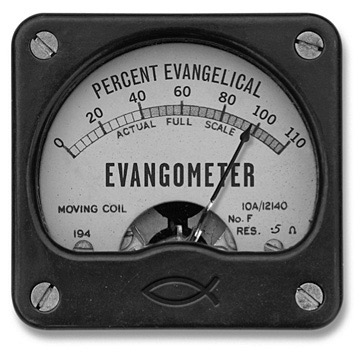Tylor Standley, a progressive liberal writer who blogs at http://tylorstandley.com , recently posted an article on Relevant Magazine entitled “6 Heretics Who Should Be Banned From Evangelicalism.” In the article, which has been shared almost 9700 times on Facebook, he seeks to answer the question:
“Can you be an evangelical Christian and believe…
…in evolution?
…that Hell is only temporary?
…that people from other religions can be saved without even knowing it?
…that the atonement is not about God’s wrath being poured out on Jesus in our place?
…that Scripture is errant?”
For the author, if you denounce any of those beliefs as false teaching, you are causing/contributing to “needless schisms and inconsistent, prideful exclusivism” within the wide orthodoxy of the Church body by trying to limit who is in and who is out.
To make the point, he gives us several famous Christians and lists off some of their more…troubling and idiosyncratic beliefs…. [ie John Stott believed in annihilationism, Billy Graham seemed to endorse universalism in his later years, etc]
Once finished listing off their unorthodox/ “unorthodox” beliefs, he concludes
Now, you hopefully find it ridiculous to reject these great and godly people. Which is why it’s amazing to me what we ignore in order to protect ourselves from the truth. We want our “heroes of the faith” to be perfect in theology and conduct, so we ignore or justify the parts we don’t like.
We all do it.
So, maybe it’s time to extend a bit more loving kindness to the evolutionists, to those who reject inerrancy, to those who take the Bible literally when it says that God will redeem all people to Himself, to the Rob Bells and the World Visions.
In response to this, Devin Murphy, a commenter in the combox, wrote this fantastic rebuttal:
I’ve seen this link thrown around today and it has earned its place in controversial blogposts of the week, for sure. Though it isn’t necessarily what was said in the blog, it was more-so because it was posted to Relevant, who has done a fairly decent job at keeping their blogs acceptable to everyone who identifies as a Christian. Though this blogpost was far more divisive.
In short, the point of the blog is to list 6 mostly-respected Christians from time-past who held controversial views that would not be accepted by today’s “evangelicalism” which the author absolutely scorns. Standley does provide some links to exactly who he’s speaking about… but both links lead to posts that aren’t there, which isn’t helpful in seeing exactly whose throat he’s going for. But don’t worry, it becomes abundantly clear whose throat he’s going for later in the article.
For people who have been in on the conversation trying to answer the question “What is evangelicalism?” or “How can we define evangelicalism?” we all know that it soon turns into muddy waters. For the most part and I would argue historically, evangelicalism simply means that people believe Jesus is the only way to God, they believe the Bible is the inerrant word of God and that God’s wrath abides on unbelievers. Pretty simple right? Well, in an attempt, for many years now, to gain influence in what has been known as the “evangelical crowd” which would include folks from the Calvary Chapel movement, the Southern Baptist Convention and conservative Presbyterians, more theologically liberal people who identify as Christians have flown the flag of “Evangelical” when their theology resembles nothing of what the majority of evangelicals have believed and identified with, which is exactly why you see those theologically conservative people rightly pushing back against the likes of Rob Bell and Rachel Held Evans over the title of “Evangelical”.
With that out of the way, I’m saying let’s scrap the debate over the title, as it is small potatoes compared to the real issue. The real issue, I’m persuaded, is “What is a Christian?” or “How can we define Christianity?” Unlike when defining a term like Evangelicalism, Christianity has a source that we can align beliefs with and see what fits. That source, of course, is the primary source of, the Bible. Now, that isn’t as easy as it sounds, but it is far better grounds to work on than a name like “Evangelical”.
Getting back to the article itself, some things must be noticed. Let’s begin with the opening questions, meant to set us up for what the author thinks is a slam-dunk on theologically conservative believers:“What does it mean to be “evangelical”?
“What must you believe? What must you reject? Can you be an evangelical Christian and believe…
…in evolution?
…that Hell is only temporary?
…that people from other religions can be saved without even knowing it?
…that the atonement is not about God’s wrath being poured out on Jesus in our place?
…that Scripture is errant?
Many evangelicals would say “no” to most—maybe even all—of these. That’s why, in an attempt to protect the name of evangelicalism, some prominent leaders within evangelicalism have made it their responsibility to publicly denounce those with whom they disagree on issues like these.”This is the springboard to launch an attack on some, who the author believes, are the sacred cows of “evangelicals” or, as I would say, theologically conservative Christians. He goes on to list 6 men who are generally esteemed in some way or another among theologically conservative Christians. Now I want to go through each of them that seem most relevant to this discussion and discuss why the author is really misrepresenting those that he characterizes, generalizes and criticizes.
1. C.S. Lewis, The Narnian himself. Beloved by probably anyone who can read. The author says that basically evangelicals love him but would never let someone who believes as he does in their pulpit at church. In other words, he’s saying to everyone who is theologically conservative is just really ignorant of what C.S. Lewis believed, and if they were consistent in their rejection of who they deem heretics, then they wouldn’t just reject Rob Bell, they’d reject C.S. Lewis too! That sounds pretty good doesn’t it? Sure. Only, evangelicals have been the ones to show the most appreciation of Lewis, as he deserves much appreciation… wait for it… while acknowledging where he wasn’t 100% orthodox in his theology! Who knew? Right? What have I heard men like John Piper, who is totally gaga over C.S. Lewis and is considered a spokesmen for much of the Reformed movement? In Piper’s biographical lecture/sermon on Lewis, he says the following:“There was something about the way he read Scripture that made my own embrace of inerrancy tighter, not looser. There was something about the way he spoke of grace and God’s power that made me value the particularities of the Reformation more, not less. There was something about the way he portrayed the wonders of the incarnation that made me more suspicious of his own inclusivism, not less. There was something about the way he spoke of doctrine as the necessary roadmap that leads to Reality, and the way he esteemed truth and reason and precision of thought, that made me cherish more, not less, the historic articulations of the biblical explanations of how the work of Christ saves sinners—the so-called theories of the atonement.”
Source: http://www.desiringgod.org/biographies/lessons-from-an-inconsolable-soulWhat Piper is describing is that even though Lewis made not-so-theologically-conservative-remarks, he certainly had a theologically conservative vibe about him that makes his work resonate so much with theological conservatives. Perhaps that’s why we don’t outright reject him. Not to mention that he wasn’t a Pastor or holding some office requiring Christians to really heed his words, he was an entirely different category.
2. Martin Luther, the angry Monk. Obviously a beloved figure to theologically conservative Protestants. What could Mr. Standley say to divert us from accepting Luther’s theology? Well, quite the charge… that Luther was… anti-inerrancy! Standley says,
“But to the dismay of every evangelical Calvinist, I fear I must be the bearer of bad news that Martin Luther apparently didn’t believe the Bible is fully inspired, true or trustworthy. Speaking of inaccuracies in the books of Chronicles, he states, “When one often reads that great numbers of people were slain—for example, eighty thousand—I believe that hardly one thousand were actually killed.”
Ok, first… to the dismay of *every evangelical Calvinist*? Um, why did he go with Calvinists in that line? Shouldn’t he be going after evangelical Lutherans when trying to say that Luther was a heretic by the standards he thinks we have? It just shows how misinformed and careless this article really was.
So how should we respond to that line from Luther? Does he, by saying what he did, reject the Bible’s inerrancy as God’s word? I say no, as we can see all over Luther, even by the Reformation itself, that he did believe that the Bible was inerrant. His issue though, which is extremely reasonable for a man in his situation, was skepticism. When Biblical truth had been so suppressed for so long, the Bible not being in the hands of hardly anyone but people commanded to practically ignore what it actually says, when you break away from such an institution, wouldn’t you be reading what was in front of you with a bit more skepticism than someone would today? Inerrancy as it is understood today has far more to undergird it than Luther had in his historical context, making the charge that he denied inerrancy completely anachronistic.
3. Augustine, the theologian of the West. Standley brings up what so many people have wrestled with for years, that Augustine wrestled with the text of Genesis to where he would laugh at Christians who take it “literally” as how we should determine how God created the world. First, what must be realized here, is that Augustine, in the 3rd century CE/AD, had no clue of what the current debates around scripture and science are today. Augustine could be said to have been trying to see other ways the text could be examined or understood, the idea of evolution was nowhere in sight at the time. It is completely careless to suggest that he believed as theistic evolutionists today believed. We must also realize that he didn’t reject a literal Adam and Eve as some theistic evolutionists believe today. Standley also isn’t careful or nuanced enough to realize that there are a wide range of views of creation that aren’t just young earth views. To suggest that every “big” leader in conservative “evangelicalism” is anti-theistic-evolution shows that Standley isn’t familiar with the likes of a Tim Keller, Hugh Ross or many others who highly esteem scripture and its theology yet make considerations about how Genesis should be interpreted (and NO, I’m not saying Keller and Ross believe the exact same thing, in case you’re wondering).
Finally, and let’s not forget who Standley is really trying to eat in this article, in his own words, “This is Augustine, the one to whom we can give credit for the doctrines of original sin and Hell as eternal conscious torment (which are at the core of reformed theology).” Yes, the Calvinists who he thinks are utterly unaware of the views of these men listed so far.4. William Barclay, someone I don’t know anything about. I know his commentaries are everywhere, but I don’t see anyone, and have never seen anyone, really interested in discussing anything he’s said, until this article. Perhaps it’s because of my theological surroundings, but he doesn’t seem comparable at all compared to the other people listed in this article. I don’t say that to speak ill of him, as I really have no clue of his theology or anyone he’s influenced. That means I don’t have anything to say about him or whether he was a universalist as the article argues.
5. John Stott, the Anglican to be feared. Standley mentions Stott’s view of annihilationism as what would keep him outside of the Evangelical/theologically conservative fold. What is interesting though is that Stott is considered one of the founders of the “Evangelical Movement” in the last 60-70 years. For Heaven’s sake he was one of the main authors of the Lausanne Covenant. If you don’t know what that is you need to Google it. Basically if you looked up “Evangelical Beliefs” in some dictionary or Encyclopedia, the Lausanne Covenant would pop up. Now, his promotion of annihilationism was controversial at the time, and in many places still is. Yet why is he still accepted as a great father in the theologically conservative West? Why didn’t Standley stop and ask himself, “Now why is he still quoted in all of these conservative books? Why is he still esteemed and frequently discussed?”… that’s an answer I’d like to know. My guess is that the assumption that theological conservatives are so stupid and ignorant of these figure’s views that there is no way they knew this about Stott…
6. Billy Graham, Mr. Altar Call. As Standley says, guilty of inclusivism. The belief that there can be people of other religions that are saved but don’t know it. He goes on to cite an interview that Graham had with Robert Schuller in 1997 where Graham, did indeed espouse a form of inclusivism. The real issue though, is that he said that in an interview in 1997 and has said it other times, but does that mean every conservative Christian should write him off as a heretic? The truth is, most already have. Maybe not most, but many, for sure, for this exact reason. I’ll pass on going into details about Graham’s theology and parts of it that seem contradictory as many already frequently debate about Graham’s views and whether he is to be trusted 100% or not as a representative of conservative theology. My point here is, that once again, Standley hasn’t given the people he’s trying to jab (Calvinists) anything that they haven’t heard. In fact, it was probably Calvinists who distrusted Graham in the first place when he began making those statements about inclusivism.
Finally, Standley goes for the haymaker. A scattering of unsubstantiated jabs that further demonstrate that he shouldn’t be taken at his word. Here is what he goes on to say after the Graham “expose”:“There are plenty of other examples: George Whitefield’s lobbying for slavery, Martin Luther’s hatred of Jews, John Calvin’s approval of burning heretics at the stake, etc. etc.”
Ok, hold the phone! Are we really going to act like these listed scenarios don’t have any nuances, contexts and complete volumes written to understand each of the events? Especially the statement about Calvin which even recent secular Calvin biographer Bruce Gordon would say is untrue. Nobody denies that there are plenty of issues with *every* dead and living theologically conservative Christian. So let’s cut to the chase of what Standley is attempting to do here.
It took a long time to get here, but this is the heart of Standley’s motivations in this article. From his own words:“So, maybe it’s time to extend a bit more loving kindness to the evolutionists, to those who reject inerrancy, to those who take the Bible literally when it says that God will redeem all people to Himself, to the Rob Bells and the World Visions.”Did you catch that? Yes, he just equated accepting these listed theological greats with accepting outright heretics who reject *many* core Christian views, far more than the 5 that I covered from the article. Because Augustine sought to understand other possible views of Genesis than the literal understanding, I should accept Rob Bell? Because John Stott said that the wrath of God on the unbeliever is different than the traditional view (still wrath though…) I should accept, Rachel Held Evans? I’m very sorry Mr. Standley but none of the people that you think theological conservatives should accept can be compared to the men in this list. The infractions against scripture as a whole by Emergent leaders like Bell and Evans are ones that even all of the people mentioned in this list would be spinning in their graves over. While this article has gained traction, it is extremely deceptive and as I said earlier, very very careless.
[Contributed by Dustin Germain]













